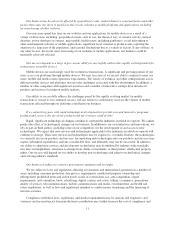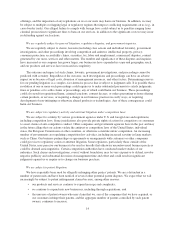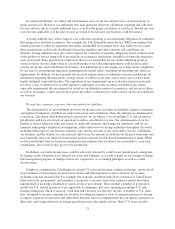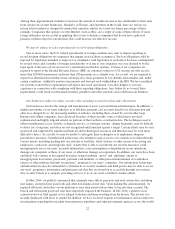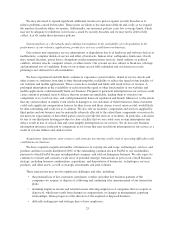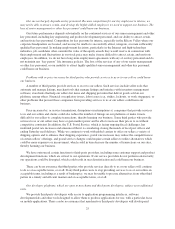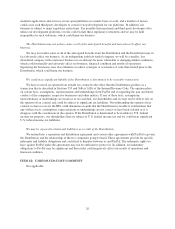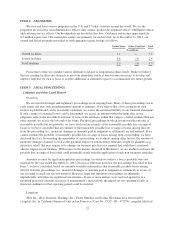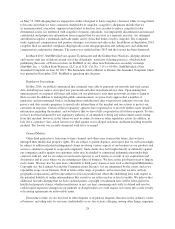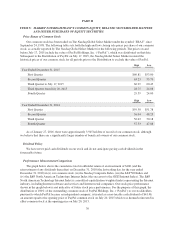eBay 2015 Annual Report Download - page 32
Download and view the complete annual report
Please find page 32 of the 2015 eBay annual report below. You can navigate through the pages in the report by either clicking on the pages listed below, or by using the keyword search tool below to find specific information within the annual report.these ratings to enhance the understanding of our sources of liquidity and the effects of these ratings on our costs
of funds. Our borrowing costs depend, in part, on our credit ratings and any further actions taken by these credit
rating agencies to lower our credit ratings, as described above, will likely increase our borrowing costs.
Our business and users may be subject to sales tax and other taxes.
The application of indirect taxes (such as sales and use tax, value-added tax (VAT), goods and services tax,
business tax and gross receipt tax) to ecommerce businesses and to our users is a complex and evolving issue.
Many of the fundamental statutes and regulations that impose these taxes were established before the adoption
and growth of the Internet and ecommerce. In many cases, it is not clear how existing statutes apply to the
Internet or ecommerce. In addition, governments are increasingly looking for ways to increase revenues, which
has resulted in discussions about tax reform and other legislative action to increase tax revenues, including
through indirect taxes. There are many transactions that occur during the ordinary course of business for which
the ultimate tax determination is uncertain.
We do not collect taxes on the goods or services sold by users of our services. However, some jurisdictions
have implemented, or may implement, laws that require remote sellers of goods and services to collect and remit
taxes on sales to customers located within the jurisdiction. In particular, the Streamlined Sales Tax Project (an
ongoing, multi-year effort by U.S. state and local governments to pursue federal legislation that would require
collection and remittance of sales tax by out-of-state sellers) could allow states that meet certain simplification
and other criteria to require out-of-state sellers to collect and remit sales taxes on goods purchased by in-state
residents. The adoption of such legislation could result in a use tax collection responsibility for certain of our
sellers. This collection responsibility and the additional costs associated with complex use tax collection,
remittance and audit requirements would make selling on our websites and mobile platforms less attractive for
small business retailers and would harm our business, and the proliferation of state legislation to expand sales
and use tax collection on Internet sales could adversely affect some of our sellers and indirectly harm our
business.
Several proposals have been made at the U.S. state and local levels that would impose additional taxes on
the sale of goods and services over the Internet. These proposals, if adopted, could substantially impair the
growth of ecommerce and our brands, and could diminish our opportunity to derive financial benefit from our
activities. While the U.S. federal government’s moratorium on state and local taxation of Internet access or
multiple or discriminatory taxes on ecommerce has been temporarily extended, this moratorium does not prohibit
federal, state or local authorities from collecting taxes on our income or from collecting certain taxes that were in
effect prior to the enactment of the moratorium and/or one of its extensions.
From time to time, some taxing authorities in the United States have notified us that they believe we owe
them certain taxes imposed on our services. These notifications have not resulted in any significant tax liabilities
to date, but there is a risk that some jurisdiction may be successful in the future, which would harm our business.
Similar issues exist outside of the United States, where the application of VAT or other indirect taxes on
ecommerce providers is complex and evolving. While we attempt to comply in those jurisdictions where it is
clear that a tax is due, some of our subsidiaries have, from time to time, received claims relating to the
applicability of indirect taxes to our fees. We have been paying VAT on fees charged to certain of our users in
the European Union based on the service provider’s location. On January 1, 2015, changes to the rules
determining the place of supply (and thus the country of taxation) for all European Union based providers of
electronically supplied services were implemented that require that we pay VAT based on the residence or
normal place of business of our customers. These changes may result in our paying a higher rate of VAT on such
fees. Additionally, we pay input VAT on applicable taxable purchases within the various countries in which we
operate. In most cases, we are entitled to reclaim this input VAT from the various countries. However, because of
our unique business model, the application of the laws and rules that allow such reclamation is sometimes
uncertain. A successful assertion by one or more countries that we are not entitled to reclaim VAT could harm
our business.
20



